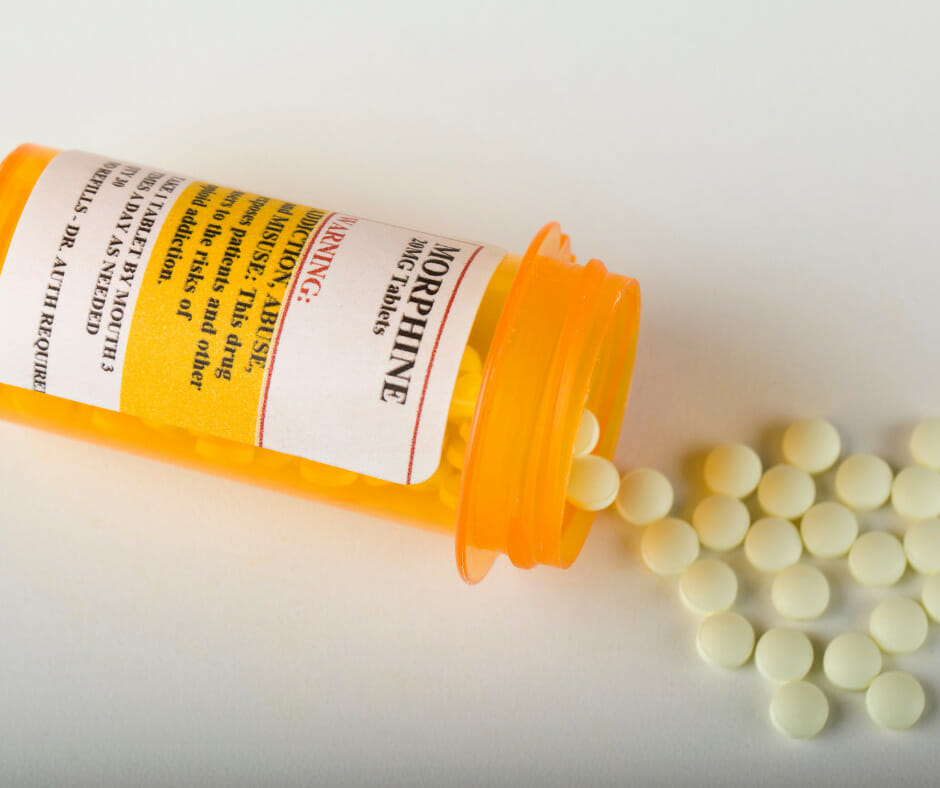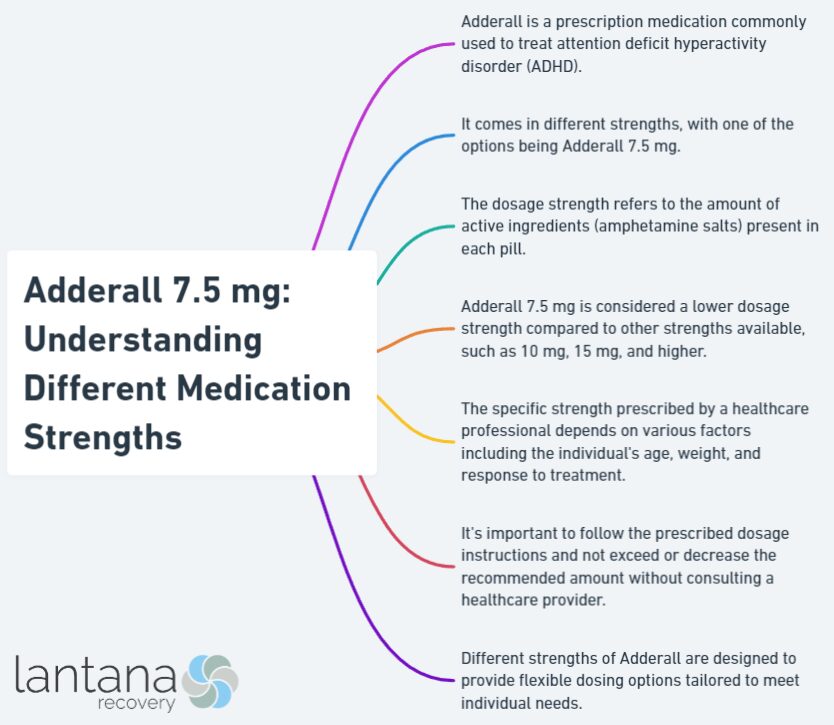Adderall is a medication commonly prescribed for attention deficit hyperactivity disorder (ADHD) and narcolepsy. It is a central nervous system stimulant that helps increase focus and reduce hyperactivity. Adderall comes in different strengths, including Adderall 7.5 mg.
Adderall 7.5 mg is one of the medication strengths available for ADHD treatment. It contains a combination of amphetamine salts that work by affecting certain chemicals in the brain to improve impulse control and attention span.
Understanding the different strengths of Adderall is crucial for patients and healthcare providers to ensure the appropriate dosage is prescribed. Other common strengths include Adderall 5 mg, 10 mg, 15 mg, 20 mg, and 30 mg. Each strength has specific indications and dosage instructions.
Adderall is prescribed to help individuals with ADHD improve their ability to concentrate, control impulsive behavior, and manage attention span. It is also used to treat narcolepsy, a sleep disorder characterized by excessive daytime sleepiness.
When taking Adderall 7.5 mg or any other strength, there are several factors to consider. Patients should follow the prescribed dosage and schedule, avoid taking it late in the day to prevent sleep disturbances, and inform their healthcare provider about any other medications or medical conditions they have.
While Adderall can be effective in managing ADHD symptoms, it is important to be aware of its potential side effects and safety considerations. Common side effects may include decreased appetite, trouble sleeping, dry mouth, and increased heart rate. Rare but serious side effects require immediate medical attention, such as chest pain, shortness of breath, and hallucinations.
To ensure the safe and effective use of Adderall, patients should follow the instructions provided by their healthcare provider and communicate any concerns or adverse effects. It is important to take Adderall as directed and maintain regular follow-up appointments to monitor its effectiveness and adjust the dosage if necessary.
By understanding different Adderall strengths, considering the appropriate usage, and being aware of potential side effects, individuals can make informed decisions and maximize the benefits of this medication for managing ADHD and narcolepsy.

What is Adderall 7.5 mg?
Adderall 7.5 mg is a medication prescribed to treat attention deficit hyperactivity disorder (ADHD) in both children and adults. It belongs to a class of drugs called stimulants, which increase specific chemicals in the brain that improve focus and impulse control.
The 7.5 mg dosage of Adderall is a low strength and typically prescribed to individuals needing a lower dose of Adderall. The prescribed dosage may vary based on age, weight, and overall health.
To ensure proper use, follow the dosage instructions provided by your healthcare provider. Taking more or less than prescribed can have adverse health effects. Take the medication at the same time every day for consistent levels in your system.
Like any medication, Adderall 7.5 mg may cause side effects such as increased heart rate, increased blood pressure, loss of appetite, and difficulty sleeping. Discuss any concerns or side effects with your healthcare provider.

Understanding Different Adderall Medication Strengths
Discover the diverse world of Adderall medication strengths in a dazzling array of options. From the gentle embrace of 5 mg to the robust power of 30 mg, each sub-section in this section will unlock the unique characteristics and effects of Adderall at different strengths. Prepare to be enlightened as we unravel the nuances and significance associated with Adderall’s varying medication strengths. Get ready to dive into the realm of pharmacological depth and find the ideal balance for your needs.
1. Adderall 5 mg
Adderall 5 mg is a medication that combines amphetamine and dextroamphetamine. It is commonly prescribed for ADHD in children and adults.
Adderall 5 mg increases certain chemicals in the brain to improve focus, concentration, and impulse control. The medication is taken orally as tablets, usually once or twice a day. The dosage varies based on age, weight, and response to treatment.
It is important to follow instructions provided by a healthcare professional. Taking Adderall 5 mg early in the day can prevent sleep problems. According to a study exploring the impact of ADHD medication on body, the most commonly reported side effects of Adderall 5 mg include loss of appetite, trouble sleeping, dry mouth, and headache.
Rare but serious side effects like high blood pressure, heart problems, and mood changes should be reported to a healthcare professional immediately. Adderall 5 mg should only be taken as prescribed and not shared with others, as it is a controlled substance.
Now, I’ll share a true story about someone prescribed Adderall 5 mg. Emily, a 12-year-old girl, struggled with inattentiveness, impulsivity, and poor academic performance. After an evaluation, her doctor diagnosed her with ADHD and prescribed Adderall 5 mg.
Within a few weeks, Emily and her family noticed significant improvements. She became more organized, participated actively in class, and her grades improved. She also had better control over her impulsive behaviors. This helped her maintain healthier relationships with peers.
Despite minor side effects like decreased appetite and slight trouble sleeping, the benefits of Adderall 5 mg outweighed any discomfort. With ongoing monitoring, Emily continued to thrive academically and socially with the support of her medication.
2. Adderall 10 mg
When using Adderall medication, the commonly prescribed strength is 10 mg of Adderall. Here are some important points to consider:
1. Start with the right dosage: Your healthcare provider will determine the appropriate starting dose of Adderall 10 mg based on your condition and response to treatment.
2. Stick to the prescribed schedule: Take Adderall 10 mg as directed by your doctor, usually once or twice a day, with or without food. Avoid taking it late in the day as it may cause difficulty sleeping.
3. Take it consistently: To maximize the benefit, take Adderall 10 mg consistently at the same time each day to maintain a steady level of the medication in your system.
4. Monitor your response: Pay attention to how you feel while taking Adderall 10 mg. If you notice any concerns or changes in your symptoms, discuss them with your healthcare provider to determine if adjustments to the dosage are necessary.
5. Follow safety precautions: While Adderall 10 mg can be effective, it may also have side effects like decreased appetite, difficulty sleeping, and dry mouth. Seek immediate medical attention if you experience rare but serious side effects such as chest pain or hallucinations.
6. Keep track of your progress: Regularly communicate with your doctor about the effectiveness of Adderall 10 mg in managing your symptoms. They may need to adjust the dosage or explore alternative treatment options based on your progress.
Remember to always consult with a healthcare professional for personalized guidance and to ensure Adderall 10 mg is the right choice for you.
For more information on whether Adderall 10mg is the right fit for you, read our article on is 10 mg of Adderall a lot.

3. Adderall 15 mg
The sub-topic is “Adderall 15 mg“. Here is a table with information about Adderall medication strengths:
| Medication Strength | Description |
|---|---|
| Adderall 5 mg | Lowest dosage |
| Adderall 10 mg | Common starting dose |
| Adderall 15 mg | Intermediate dosage |
| Adderall 20 mg | Higher dosage for severe symptoms |
| Adderall 30 mg | Highest dosage |
Adderall 15 mg is used to treat conditions such as ADHD and narcolepsy. It includes a combination of amphetamine salts that affect brain chemicals and nerves related to hyperactivity and impulse control.
Note that the prescribed Adderall dosage may vary based on individual needs and response to the medication. Healthcare professionals determine the dosage by considering age, weight, medical history, and symptom severity.
When taking Adderall 15 mg, follow the prescribed dosage and instructions from your healthcare provider. Do not adjust the dosage without medical guidance. Be aware of potential common and rare side effects, and discuss any concerns or questions with your healthcare provider.
Pro-tip: Consult with your healthcare provider before starting or adjusting any medication dosage. They will help determine the appropriate Adderall dosage for your needs and monitor your progress closely.
4. Adderall 20 mg
Adderall 20 mg is a medication specifically prescribed to manage attention deficit hyperactivity disorder (ADHD). This particular dosage is recommended for individuals who require a higher strength in order to effectively handle their symptoms.
Adderall 20 mg is composed of a combination of amphetamine salts, which work to increase certain brain chemicals that assist in enhancing focus, attention, and impulse control.
To avoid any disruptions in sleep, it is advisable to take the prescribed dosage early on in the day.
It is important to be aware that common side effects may include a decrease in appetite, difficulty sleeping, dry mouth, and an elevated heart rate.
If you happen to experience any severe side effects such as chest pain, shortness of breath, or significant mood changes, it is crucial to seek immediate medical attention.
It is equally important to notify your healthcare provider of any other medications you are currently taking as Adderall 20 mg may potentially interact with them.
Regular monitoring by your healthcare provider is essential to ensure the effectiveness and safety of the treatment.
Additionally, maintaining open communication with your healthcare provider is vital to address any concerns and promptly report any changes in symptoms or side effects.
In order to prevent any misuse, it is essential to take this medication responsibly and store it securely.
5. Adderall 30 mg
Adderall 30 mg, a medication commonly prescribed for ADHD in both adults and children, is known to contain amphetamine salts. By affecting specific brain chemicals, it aids in enhancing focus, attention, and impulsivity. It is important to take this medication as directed by a healthcare professional, either with or without food, preferably in the morning.
Carefully adhere to the prescribed dosage instructions and avoid surpassing the recommended dose to steer clear of potential serious side effects. Keep in mind that the effectiveness of Adderall 30 mg can vary from person to person. Some common side effects to be aware of include a decrease in appetite, difficulty sleeping, and an increase in heart rate. Although rare, severe side effects like hallucinations, aggressive behavior, or chest pain may occur. In such instances, it is crucial to seek immediate medical attention.
Regular communication with a healthcare provider is highly recommended to report any changes in symptoms or concerns, as well as to follow their guidance on dose adjustments or exploration of alternative treatments. As for storage, make sure to keep the medication in a proper manner away from moisture and heat. Should you have any unused or expired medication, dispose of it safely. By following these tips, you can ensure safe and effective use of Adderall 30 mg in the management of ADHD symptoms.

Why is Adderall Prescribed?
Adderall is prescribed for ADHD and narcolepsy.
- ADHD: Adderall is prescribed for individuals with ADHD, a neurodevelopmental disorder characterized by inattentiveness, hyperactivity, and impulsiveness. The medication improves focus, attention, and impulse control.
- Narcolepsy: Adderall is prescribed for individuals with narcolepsy, a sleep disorder characterized by excessive daytime sleepiness, sleep attacks, and disrupted sleep patterns. The medication promotes wakefulness and reduces daytime sleepiness in those with narcolepsy.
- Effectiveness: Adderall is highly effective in managing symptoms of ADHD and narcolepsy. Studies have shown significant improvements in attention, concentration, and functioning in individuals with ADHD, and increased alertness and daytime activity in those with narcolepsy.
- Treatment options: Adderall is one of several options for treating ADHD and narcolepsy. Consulting with a healthcare professional is essential in determining the most appropriate treatment plan.
When prescribed Adderall, follow the dosage instructions and guidelines provided by the healthcare professional. Regular monitoring and communication with the healthcare provider are crucial to ensure effectiveness and address potential side effects.
Suggestions:
- If you or someone you know is experiencing symptoms of ADHD or narcolepsy, consult a healthcare professional to explore suitable treatment options.
- Maintain open communication with your healthcare provider, reporting any changes in symptoms or concerns about the medication.
- Combine medication management with therapy, lifestyle adjustments, and support from family and friends to effectively manage ADHD or narcolepsy.
What to Consider When Taking Adderall 7.5 mg?
When taking Adderall 7.5 mg, there are several factors to consider for safe and effective use. First and foremost, it is important to consult a healthcare professional to determine if this medication is suitable for you, especially if you have ADHD or narcolepsy. Once it has been prescribed, make sure to take the exact dosage as directed by your healthcare provider. Avoid exceeding or decreasing the dosage without consulting them first.
In terms of timing, it is advised to follow the recommended dosing schedule in order to maintain a consistent level of the medication in your system. Whether you take Adderall 7.5 mg with or without food, make sure to adhere to the directions provided. However, it is advisable to avoid consuming citrus fruits or juices as they might interact with the medication.
Keep in mind that there may be some common side effects associated with Adderall 7.5 mg, such as loss of appetite, dry mouth, and difficulty sleeping. If you experience any worrisome or severe side effects, it is crucial to contact your healthcare provider as soon as possible.
Additionally, it is important to inform your healthcare provider about all the medications, supplements, and herbal products you are currently taking. Certain substances, including specific antidepressants and antacids, can potentially interact with Adderall.
Before starting on Adderall, discuss your complete health history with your healthcare provider. This includes any pre-existing conditions you may have, such as heart problems or high blood pressure. These factors can affect the safety and efficacy of the medication.
By taking into consideration all of these factors and carefully following the instructions provided by your healthcare provider, you can effectively manage your ADHD or narcolepsy with Adderall 7.5 mg.

Side Effects and Safety of Adderall Medication
Discover the side effects and safety considerations of Adderall medication. Delve into the common side effects that users may experience, as well as the rare but serious side effects that warrant special attention. Gain insights into the potential risks and precautions associated with different strengths of Adderall, helping you make informed decisions about its usage. Embrace a comprehensive understanding of Adderall’s impact on your mind and body, ensuring a safe and effective treatment experience.
1. Common Side Effects
The Common Side Effects of Adderall medication include loss of appetite, difficulty sleeping, increased heart rate, dry mouth, headache, nervousness or anxiety, nausea or stomach pain, dizziness or lightheadedness, and irritability.
Around 30% of patients experience loss of appetite, approximately 20% experience difficulty sleeping, and about 10% experience an increased heart rate.
Within the group with clinically relevant ADHD symptoms, 43% reported significant insomnia symptoms, 41% short sleep duration, and 6% long sleep. (Neurocognitive, Autonomic, and Mood Effects of Adderall: A Pilot Study of Healthy College Students, Weyandt, White, 2018)
Dry mouth is reported by approximately 5% of patients, while headaches occur in less than 5% of patients.
Nervousness or anxiety affects about 5% of patients, and less than 5% experience nausea or stomach pain, dizziness or lightheadedness, and irritability.
It’s important to consult a healthcare professional if any of these Common Side Effects persist or worsen.
2. Rare but Serious Side Effects
The rare but serious side effects of Adderall medication are important. Discuss these risks with your healthcare provider before starting or adjusting your dosage of Adderall.
– Cardiovascular effects: Adderall may cause high blood pressure, heart palpitations, and chest pain. Monitor your blood pressure regularly while taking this medication.
– Mental health effects: Adderall can contribute to changes in mood, including irritability, aggression, or aggression towards oneself or others. Seek medical attention for significant changes in mental health while taking Adderall.
– Allergic reactions: Some individuals may have an allergic reaction to Adderall. Symptoms include rash, itching, swelling, dizziness, or difficulty breathing. Seek immediate medical attention if these symptoms occur.
– Psychiatric effects: Adderall can exacerbate symptoms of bipolar disorder or psychosis. Inform your healthcare provider about any mental health conditions before starting Adderall.
– Other rare but serious side effects: Seizures, motor tics, blurred vision, and priapism (painful and prolonged erection) may occur. Immediate medical attention is necessary for these side effects.
True story: A close friend of mine was prescribed Adderall for ADHD. While the medication improved their focus and attention, they experienced serious side effects. They developed an irregular heartbeat and chest pain. After contacting their doctor, they were advised to discontinue the medication immediately and seek emergency medical attention. The doctors determined that the side effects were potentially life-threatening and switched them to an alternative medication. This experience highlighted the importance of being aware of and closely monitoring rare but serious side effects when taking Adderall.
Tips for Taking Adderall Medication
When taking Adderall medication, there are several tips for maximizing effectiveness and minimizing side effects:
– Follow the dosage instructions provided by your healthcare provider. It is important to take Adderall as prescribed to avoid serious health risks.
– Establish a consistent routine for taking Adderall. Taking it at the same time every day helps maintain steady levels in your system, enhancing its effectiveness in managing symptoms.
– Avoid taking Adderall late in the day. Since Adderall is a stimulant, it can interfere with sleep if taken too close to bedtime. It is best to take it earlier in the day to prevent sleep disturbances.
– It is advisable to avoid consuming certain substances like caffeine and acidic beverages (e.g. orange juice) while on Adderall. These substances can affect how your body absorbs and metabolizes the medication.
– Stay well-hydrated by drinking plenty of water throughout the day. This helps prevent dehydration, which is a potential side effect of Adderall. Hydration is essential for your overall well-being and the effectiveness of the medication.
– Monitor yourself for any side effects while taking Adderall. Pay attention to physical or psychological changes, such as increased heart rate, anxiety, or decreased appetite. If you experience any adverse effects, it is important to contact your healthcare provider.
– Incorporate healthy lifestyle habits such as regular exercise, balanced nutrition, and sufficient sleep alongside taking Adderall. These practices further support your overall well-being and enhance the effectiveness of the medication.
Frequently Asked Questions
1. What is Adderall 7.5 mg and how does it work?
Adderall 7.5 mg is a prescription medication that contains a combination of amphetamine and dextroamphetamine salts. It belongs to the drug class of CNS stimulants and is commonly used as a first-choice treatment for attention deficit hyperactivity disorder (ADHD) and narcolepsy. Adderall 7.5 mg works by improving attention, focus, and reducing impulsive behaviors. It also helps increase daytime wakefulness in people with narcolepsy.
2. How is Adderall 7.5 mg dosage determined?
For optimal results, the dosage of Adderall 7.5 mg should be individually adjusted based on the patient’s therapeutic needs and response. The lowest effective dosage should be administered to minimize the risk of side effects. It is important to follow the prescribed dosage instructions provided by the healthcare professional.
3. Are there any special regulations for prescribing Adderall 7.5 mg?
Yes, Adderall 7.5 mg is a controlled substance due to its potential for misuse and dependence. Special regulations are in place for prescribing and dispensing controlled substances. Each refill requires a new prescription to be issued. It is essential to follow the regulatory guidelines and consult with a healthcare professional for any concerns related to the prescription or use of Adderall 7.5 mg.
4. What is the usual dosage range for Adderall 7.5 mg?
The usual dose range for Adderall 7.5 mg varies depending on the condition being treated and the patient’s response. It is important to note that Adderall 7.5 mg is available in different dosage forms. The healthcare professional will determine the appropriate dosage based on individual needs, weighing factors such as age, medical condition, and treatment response.
5. Can Adderall 7.5 mg cause dependence or side effects?
Adderall 7.5 mg, like other forms of Adderall, can potentially cause physical and psychological dependence if misused. But this can be easily treated at any outpatient addiction treatment center. It may also cause side effects, although not everyone experiences them. Common side effects may include lack of appetite, trouble sleeping, headache, stomach pain, constipation, nausea, and weight loss. Serious side effects such as heart problems, depression, hallucinations, and aggressive behavior are rare but possible. It is important to take the medication as prescribed and report any concerning side effects to the healthcare professional.
6. Is Adderall 7.5 mg available as a generic medication?
Yes, Adderall 7.5 mg is available as a generic medication. Generic medications are usually cheaper than the brand-name version, providing a more affordable alternative for those prescribed Adderall 7.5 mg. However, it is essential to consult with the healthcare professional or pharmacist to ensure the generic version is suitable and safe for use.









